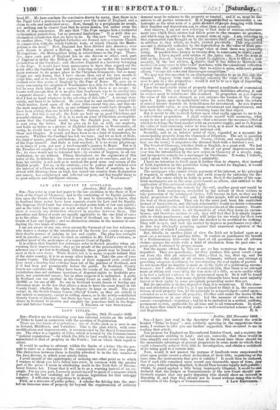LAW AND EQUITY IN SCOTLAND.
Aberdeen, 28th November 1860.
Elre.--sTou refer in your last paper to the late abolition in the State of New York of the Court of Chancery, and to the conferring of its Equity jurisdic- tion upon the Courts of Common Law. It may be interesting to know, that in Scotland there never have been separate courts for Law and for Equity. The Supreme Civil Court has always decided points both of law and equity; and as the latter has become as much subject to fixed rules as the former, there is scarcely any distinction observed in practice between them. The procedure and forms of court are equally applicable to the one kind of cases as to the other. The Inferior Civil Courts of Scotland are in like manner Courts of Law and Equity ; and no distinction obtains in the manner of con- ducting the two kinds ot actions.
I am not aware of any one, even among-the foremost of our law reformers, who desires a change in the constitution of thp Scotch law courts as regards their double powers of judging in law and equity. The plan has wrought well in practice ; and it may be cited, in addition to Mr. Field's evidence, as another proof of the uselessness of a separate Court of Equity. It is seldom that English law reformers refer to Scotch practice when ad- vocating their improvements: they go for proofs of the practicability of their schemes anywl see but to Scotland, although those proofs may be found al- most at their own doors. While Scotch law is in many respects behind that of the sister country, it is in as many other before it. Take the case of your County Courts. The dolorous prophecies of their supposed evils could not have stood a hearing had evidence been led of the practice of Scotland, and if it had been put prominently before the public. In Scotland, County Courts are centuries old. They have been the courts of the country. Their jurisdiction does not embrace questions of disputed rights to heritable pro- perty, nor consistorial causes ; but in other respects it is unlimited. A party m Scotland can sue another in the County Court as easily for a claim of 50,0001. as for one of 501. No one in Scotland woUld dream of having any alteration made in the law that allows a man to have his cause heard in the County Court, whether the claim in dispute be large or small. The pro- cedure in the Scotch County Courts (Sheriff' Courts, as they are called) is not indeed so summary, except in trilling causes, as in the newly-established County Courts of England; but there has been and still is, a gradual ten- dency in Scotland to shorten and simplify the procedure both in the Supe-
























 Previous page
Previous page